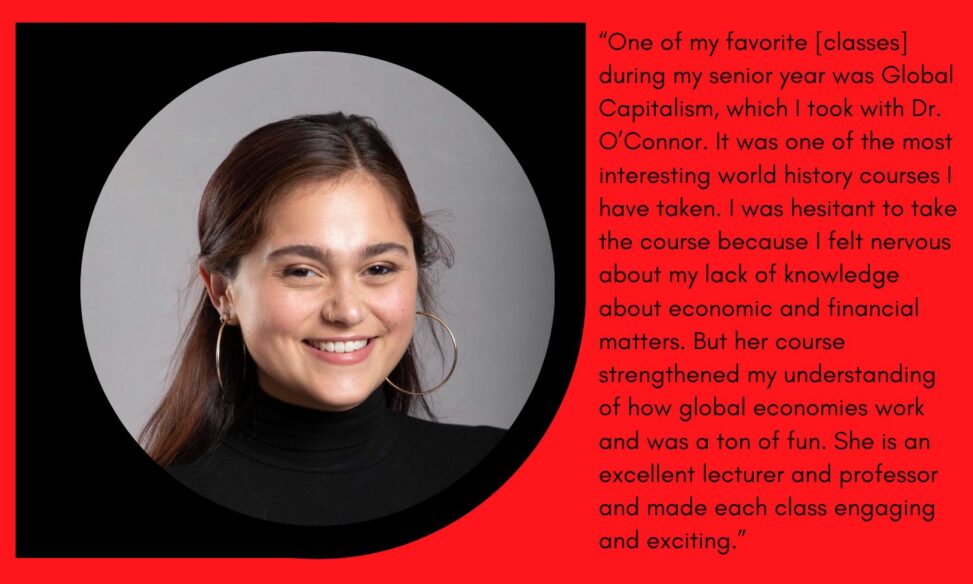I graduated in the spring of 2023. As a History major, I won the Lenore F. McGrane Prize for the Most Promising Student in History (a faculty-nominated award) in 2022, the Newberger prize for the best Digital, Public History, or Media Project for her capstone, “I don’t have a good education. Should I be afraid to be treated in a hospital?”: An Analysis of Informed Consent in the Cincinnati Radiation Experiments: 1960-1972,” in 2023, and I was a faculty-nominated recipient of the Daughters of the American Revolution scholarship for the 2022-2023 academic year. I am also a member of Phi Beta Kappa.
What are you up to these days?
I just started my second semester at Harvard Law School!
What brought you to history at UC?
While still in high school, I knew I wanted to attend law school. As a result, I knew I wanted an undergraduate degree that would prepare me for that next step while also using those four years for something exciting and meaningful. I had been advised to study whatever subject had been my favorite class in grade school, which was always history. I chose UC specifically because I was interested in local history and because I wanted an affordable option since I knew grad school would be expensive.
What did you focus on as a history student at UC?
I focused almost exclusively on the history of UC itself. During my sophomore and junior years, I worked on a research project with Dr. Anne Delano Steinert into the life and legacy of UC’s first female history professor, Dr. Miriam Urban. She and I published an article in the American Jewish Archives Journal. This project and Dr. Steinert’s History of Cincinnati course sparked my interest in local history. During her class, I first learned about the Cincinnati Radiation Experiments. My work on the experiments began during my sophomore year as a group project in one of Dr. Holly McGee’s history courses, but carried on for three more years, culminating in my senior capstone.
Did you have any favorite history courses? Which ones and why?
It’s hard to pick just one class because I truly loved all of them. One of my favorites during my senior year was Global Capitalism, which I took with Dr. O’Connor. It was one of the most interesting world history courses I have taken. I was hesitant to take the course because I felt nervous about my lack of knowledge about economic and financial matters. But her course strengthened my understanding of how global economies work and was a ton of fun. She is an excellent lecturer and professor and made each class engaging and exciting.
What did you focus on in your capstone and why?
I focused entirely on the Cincinnati Radiation Experiments and focused my capstone on informed consent within the study. After working on that research for two years already, it felt like the natural choice to continue working on something I had already put so much work into. I focused on the issue of informed consent because it had been a grey area in my research. Through my research, I could fill in an area of this history that had gone unaddressed thus far and describe the legal and political context that created the lack of informed consent within the experiments.
What skills did you pick up from studying history that have served you well beyond your courses?
As a law student, I use skills from my history degree daily. As a history student, I became a much stronger writer and critical thinker. I also developed strong time management skills, juggling the reading assignments for my various classes with my extracurriculars and internships. Finally, being a history student made me a much better reader. I learned to read closely, interrogate my sources, and be more analytical. These skills have prepared me for success as a law student and future attorney.
Have any advice for current students?
Figure out what your goals are, and then figure out what support or help you need to get there. There are so many incredible resources and people available to support you, whether it’s to do research, find a job or internship, apply to graduate school, or something else entirely. Similarly, find whatever mentorship works best for you. My mentors within the history department have been incredible role models and supports, both during my time at UC and after.
